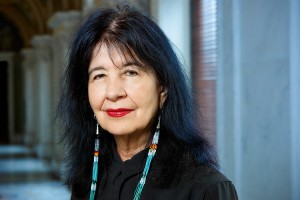Poet Laureate Joy Harjo
Wednesday, September 18th, 2019September 18, 2019
Tomorrow, September 19, writer Joy Harjo will become the first Native American poet laureate of the United States. The poet laureate, appointed by the librarian of Congress, works to increase the national appreciation and awareness of poetry. Harjo is a member of the Muskogee (also spelled Muscogee or Mvskoke) Creek Nation. Harjo will succeed the American poet Tracy K. Smith, who has served in the position since 2017.

Native American writer Joy Harjo will become poet laureate of the United States on Sept. 19, 2019. Credit: Shawn Miller, Library of Congress
Harjo was born Joy Foster in Tulsa, Oklahoma, on May 9, 1951. Her father was Muskogee Creek, and her mother was of Cherokee and European ancestry. At age 19, Joy became a member of the Muskogee Creek Nation and took the last name of her father’s mother—Harjo—a common last name among the Muskogee. Harjo earned a B.A. degree in creative writing from the University of New Mexico in 1976 and an M.F.A. degree from the University of Iowa Writers’ Workshop in 1978. She has since taught at the Institute of American Indian Arts in New Mexico and at universities in several states.
In 1975, Harjo published her first collection of poems in a short book called The Last Song. Her first full-length volume of poetry was What Moon Drove Me to This? (1979). Her poetry became well known with such collections as She Had Some Horses (1983), In Mad Love and War (1990), and The Woman Who Fell from the Sky (1994). Her forceful, intimate style draws on both natural and spiritual influences. Her poems often incorporate elements of Native American mythology and imagery. Harjo’s later collections include A Map to the Next World (2000), How We Became Human (2002), Conflict Resolution for Holy Beings (2015), and An American Sunrise (2019). She has won many awards for her work.
Harjo also wrote The Good Luck Cat (2000), a children’s picture book about a girl who worries about her lucky cat, which has used up eight of its nine lives. A poetic picture book for young adults called For a Girl Becoming (2009) celebrates the birth of a baby girl and the girl’s path to adulthood. Harjo’s memoir, Crazy Brave (2012), describes her own youth and her discovery of her creative voice.
Harjo has written screenplays for television and contributed, as a writer or narrator, to several documentaries on aspects of Native American culture. As an accomplished musician and saxophone player, she has released several recordings. She also is an activist for Native American and other causes.


